TV Viewers Disappointed With Iran's Proreform Candidate
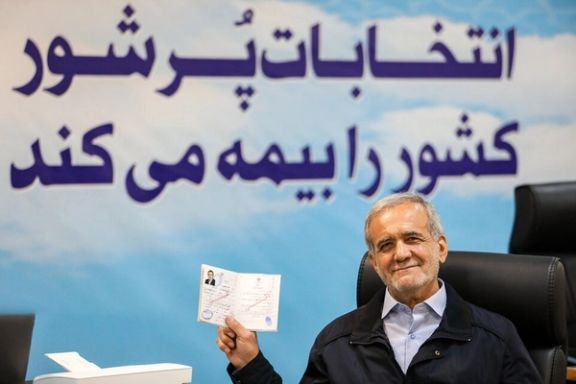
The first TV interviews with the leading 'reformist' and conservative candidates on state television Monday appear to have disappointed both politicians and ordinary voters.

The first TV interviews with the leading 'reformist' and conservative candidates on state television Monday appear to have disappointed both politicians and ordinary voters.
Although all the candidates have similar weakness according to viewers comments on social media, most criticisms were directed at proreform candidate Massoud Pezeshkian and conservative hopeful Mohammad Bagher Ghalibaf.
Pezeshkian's blunders and weaknesses came as a surprise to viewers who had high expectations of him. Many anticipated that he would be as neatly dressed and articulate as former reformist President Mohammad Khatami.
Many criticized Pezeshkian for his more than casual outfit, while other candidates appeared nice and tidy. But not all the criticisms of the ‘reformist’ candidate was about his appearance. As one observer noted: "The way he dressed was disrespectful to the people. He spoke about the economy for nearly 40 minutes and did not mention the word 'sanction' even once. Generally, he said that he would continue former President Ebrahim Raisi's path and will follow his policies. He reiterated that he does not have any plan or policy of his own."
One of the key issues in this election is the future of the country’s battered economy and the steep fall in living standards. US and other sanctions are a key factor in devastating an already weak economy, mired by state controlled, lack of competitiveness and mismanagement. Ordinary workers now make around $200 a month in the capital Tehran, while Iran sits on vast oil and natural gas reserves.
A pro-reform politician Mahmoud Sadeghi wrote that "based on the initial review of proreform voters' views about Pezeshkian's interview, he appeared less than their expectations. If the only reformist candidate continues his campaign in the same way, he cannot encourage voters to go to the polls for him."
Iranian journalist Mohammad Aghazadeh wrote: "The televised interview showed that none of the conservative candidates were as loyal as the reformist Pezeshkian to former President Raisi's policies and the government's conservative guidelines. I think he is the most loyal individual to the hard core of political power in Iran."
Another Iranian journalist, Gholamreza Nouri Ala, advised Pezeshkian to be himself and not to imitate anyone. "Do not shut the people's last outlet for hope!" Meanwhile, an Iranian journalist in London, Homayoun Kheyri opined that "Pezeshkian's first interview was good. He delineated the playground for all the pillars of power in Iran as well as for his rivals and did not offer any irrelevant promise."
Proreform Muslim scholar Yaser Mirdamadi wrote: "Pezeshkian disappointed everyone as he said he has come to continue the old policies, though with minor alteration, not by introducing essential changes."
Ghalibaf faced criticism for stating in his interview that, if elected, he would run his government using the same politicians, statesmen, and staff currently working with the government.
An observer pointed out that when speaking about the economy, Ghalibaf avoided the terms market economy and free market and said instead that progress will come with investment and wealth creation but did not say how.
As observed by one viewer, before broadcasting Ghalibaf's interview, the Iranian state television showed a caption that said the airing of his interview has been delayed as edits had to be made to the tape! During the interview, Ghalibaf said that he was the father of Iran's missile industry.
As Iranian journalist Davoud Heshmati pointed out, it seems that the candidates have missed their first opportunity to let viewers know about their plans and ideas for the future.
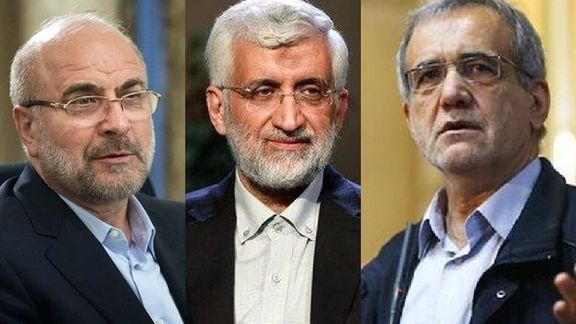
The generally accepted master narrative about Iran's presidential election describes it as an engineered election with a pre-determined winner.
Supreme Leader Ali Khamenei referred to the process as “determining a president” instead of electing one. While this might have been a natural slip of the tongue, many public speakers and social media users interpret it as a Freudian slip, suggesting that it reveals his true intentions.
There are also a few key narratives under the master narrative, including Mohammad Bagher Ghalibaf being the next president of Iran regardless of who the people would prefer.
Another key narrative advanced by politicians like Heshmatollah Falahatpisheh, the former chief of the Iranian parliament's national security committee, is that the mere presence of the hardliner former nuclear negotiator Saeed Jalili as a presidential candidate sends a clear message to the West: Iran is not interested in cooperating on its ambitious nuclear program, which some Western and many regional powers view as a regional and global security threat.
Another notable narrative is that the main competition in this election was initially between Jalili and Ghalibaf. However, the inclusion of a "reformist" candidate among the six approved by the Guardian Council has shifted the dynamics from a bipolar contest between the two conservatives to a triangular competition. The third contender is 'pro-reform' heart surgeon Massoud Pezeshkian, who has served multiple terms in parliament.
The master narrative doubts that any of the three—ultraconservative Jalili, neocon Ghalibaf, or pro-reform Pezeshkian—will secure half of the votes cast in the first round of the election on June 28. As a result, it is expected that two of them will face each other in a runoff election one week later, where the candidate with the most votes will become Iran's new President.
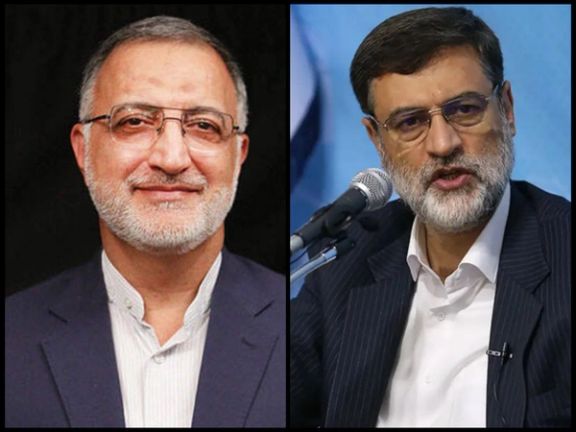
Another narrative suggests that the other three candidates—Martyrs Foundation head Amir Hossein Ghazizadeh Hashemi, Tehran Mayor Alireza Zakani, and former Justice Minister and intelligence operative Mostafa Pourmohammadi—are not serious contenders. Instead, they are believed to be supporting Ghalibaf against Pezeshkian and Jalili. In fact, the first two played a similar role in the 2021 election, protecting the intended winner, Ebrahim Raisi, against his rivals.
Meanwhile, prominent Iranian analyst Morad Veisi said in an analysis for Iran International that Pezeshkian is playing the same part that proreform Abdolnasser Hemmati played in the 2021 election. Although he ultimately received less than the number of invalid votes, his presence gave the government the cover to pretend that ‘reformists’ were represented in that election.
It is based on these narratives that seasoned commentators in Iran, such as Abbas Abdi, have said that "If the official assumption is that Pezeshkian has no chance to be elected president and his presence is meant only to boost the turnout, I suggest to get him out of the game immediately so that the errors made in 1997 and 2013 will not be repeated. "
Abdi was referring to fact that Mohammad Khatami's landslide victory in the 1997 and Hassan Rouhani's victory in the 2013 elections against key conservative figures came as surprise for Iranian hardliners including the Supreme Leader.
Abdi added that "The current election is most likely to end in the first round," meaning that Pezeshkian may win the election if disillusioned voters put their weight behind him. In that case, Abdi said, that those who endorsed Pezeshkian's credentials will be held accountable for the consequences of their decision.
Iran's last parliamentary and presidential elections in 2020, 2021, and 2024 have witnessed dwindling turnout. Segments of voters who have lost hope in elections as a means to improve their worsening economic situation could potentially give a 'reformist' candidate the edge needed to rise to the top.
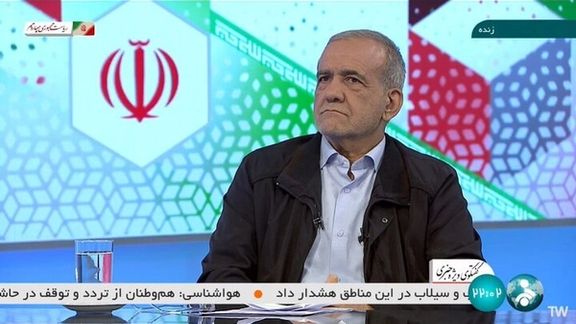
Iran’s state TV began its programs introducing the six handpicked presidential candidates on Monday, airing recorded interviews with each candidate before four-hour TV debates take place starting next week.
The interviews with Masoud Pezeshkian and Parliament Speaker Mohammad-Bagher Ghalibaf took place on Monday and were focused on the economy and other issues without any reference to foreign policy, the nuclear issue, or hijab.
In his first interview with the news channel Monday evening, Pezeshkian, the only approved ‘reform’ candidate referred to the “divide between the people and the government” as a major issue.
Pezeshkian stressed that his government would not introduce any new economic strategies and policies. Instead, he said, it will try to efficiently implement the existing development plan by reforming the administrative system, making it transparent and accountable.
Pezeshkian criticized the lack of justice in distribution of wealth and resources among the country’s provinces and stressed the importance of improving the lives of civil servants, relying on experts and the elite personnel, improving and stabilizing the environment for domestic and international investment for a desirable level of economic growth.
However, the issue in Iran is not only fair distribution but lack of resources to distribute. The country’s bombastic foreign policy and its expanding nuclear program have impeded oil exports, foreign trade, technology and investments.
Pezeshkian, 69, is running against five hardliners including “neo-conservative” Parliament Speaker Mohammad-Bagher Ghalibaf and former nuclear negotiator Saeed Jalili.
The outspoken cardiac surgeon, served as health minister under reformist Mohammad Khatami and has been elected five times as representative of Tabriz, capital of the East Azarbaijan Province since 2007. He was deputy speaker from 2016 to 2020.
Spokesman of the Reforms Front, Javad Emam, in a statement Sunday expressed regret over the disqualification of the Front’s two other candidates, Abbas Akhundi and former Vice-President Es’haq Jahangiri, as well as candidates of other political groups and confirmed that the Front would be supporting Pezeshkian as its candidate.
The Reforms Front had insisted it would not participate in the elections if none of its three proposed candidates were allowed to run. The Front’s leader, former President Mohammad Khatami, abstained from voting in the parliamentary elections in March to protest the extensive disqualification of ‘reformist’ candidates by the un-elected watchdog, the Guardian Council.
In a short statement Monday, Jahangiri who also registered to run but was barred by the Guardian Council announced his full support for Pezeshkian as the Reforms Front’s candidate.
In a tweet Monday, however, former Vice-President Mohammad-Ali Abtahi warned about too much optimism over Pezeshkian’s chances of being elected based on the increasing attention he is gaining on social media. “Social media only reflects [the views] of a small part of the society. Candidates and their supporters shouldn’t be misled by the social media,” he tweeted.
Journalist and political commentator Ahmad Zeydabadi opined in an interview that for Pezeshkian to succeed, he must become a symbol of change for the younger generation like the leader of the Green Movement Mir-Hossein Mousavi in the 2009 elections.“Two things matter to those who want to vote: what direction are [the candidate’s] plans and how feasible their execution is given the existing structures,” he wrote.
“Mr. Pezshkian has high influence among ethnic groups,” Zeydabadi said, adding that not only the Turki-speaking population but also the Kurds and other ethnic minorities may go to the ballots to vote for him. According to Zeydabadi Pezeshkian’s chances of being elected is good but “what happens after he is elected” that worries him.
Pezeshkian is the front-runner in an online poll by Tabnak, a conservative news website close to the secretary of the Expediency Council, Mohsen Rezaei, with 67 percent of the 16,500 votes Monday. In the same poll, Ghalibaf and Jalili both have less than 13 percent of the votes.
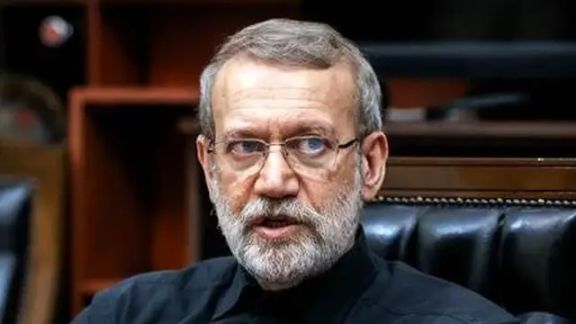
Three presidential candidates in Iran, who were barred from running, have issued statements criticizing the 12-member unelected Guardian Council, which operates under the influence of Supreme Leader Ali Khamenei.
The Guardian Council, which vets candidates, approved only six out of more than 80 who registered to run. Key figures, including former parliament speaker Ali Larijani and former president Mahmoud Ahmadinejad, were disqualified.
Ali Larijani, the former Speaker of Parliament, whose qualification for the presidential election was rejected for the second consecutive term, said the Guardian Council's mechanism is "non-transparent." At the same time, two former senior officials Es’haq Jahangiri and Abbas Akhoundi have called on the Guardian Council to explain their disqualifications.
Over the past three decades, the Guardian Council has rejected hundreds of candidates in presidential and parliamentary elections. However, the practice has become more notorious since 2020, as the Council has barred non-hardliners from running in two parliamentary and one presidential vote. In 2021 also, key candidates were blocked, paving the way for hardliner Ebrahim Raisi from winning in a low-turnout election.
On Monday, Larijani published a message, the full text of which was posted on the social media platform X, stating that despite positive opinions from responsible institutions and a ruling from the judiciary dismissing some of the council’s past claims, the Guardian Council, with a "non-transparent mechanism," prevented his re-nomination.
In his protest letter on Monday, Larijani wrote: "What prompted me to enter the election was the prevailing critical situation, especially in the realm of the harsh economic conditions and Iran’s sensitive international position, particularly the oppressive sanctions impacting the livelihoods of our dear people. I hoped that with your help, we could overcome these obstacles and pave the way for Iran's national development."
Previously, Larijani, as the Secretary of the Supreme National Security Council, played a role in negotiations on the Islamic Republic's nuclear issue with global powers. He also contributed to the formation of the long-term agreement between the Islamic Republic and China.
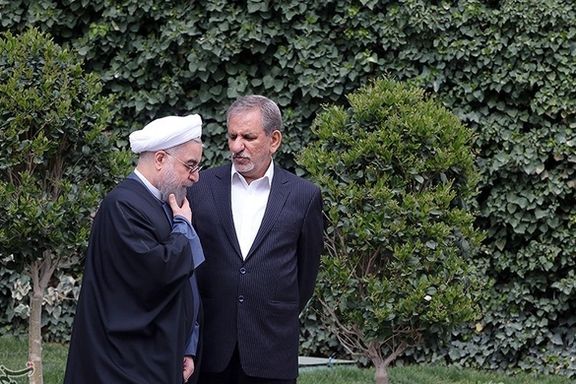
Former President Hassan Rouhani’s top aide and vice president Es’haq Jahangiri also protested the rejection of his qualification in a post on X. He demanded that the Guardian Council should disclose the reasons behind its decision. In previous elections, Jahangiri’s candidacy for the presidential election had been approved.
Abbas Akhoundi, a former minister, and another disqualified candidate, addressed the chairman of the Guardian Council, 97-year-old Ahmad Jannati in a statement on the social media platform X. He wrote, "I suspect that some reports received by the Council may have created ambiguities in the minds of some esteemed members of the Council."
He added, "I wish to defend my legal rights and those of the voters in an official session of the Council. Therefore, I request to be present at the Council's meeting within the legally prescribed timeframe to provide the necessary explanations."
So far, former President Mahmoud Ahmadinejad has not issued a statement about his own disqualification. He was considered a key candidate with a potential large voter base among ordinary people. Ahmadinejad, who was also barred from the 2017 presidential elections, has become a vocal critic of the top echelons of the regime, and promised major changes if elected president.
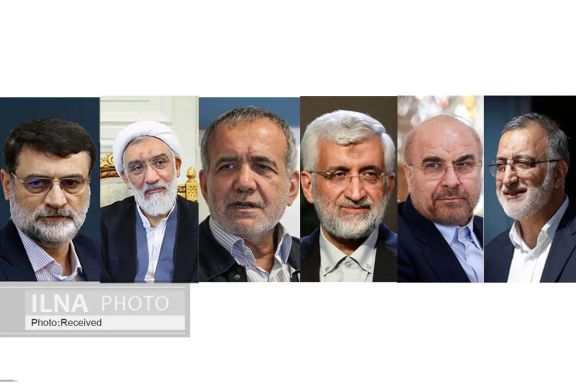
On Sunday, Iran announced the finalists for the presidency after the death of Ebrahim Raisi in a helicopter crash. The list represents Supreme Leader Ali Khamenei’s purge of the system with an eye towards his own succession.
Former Speaker of Parliament Ali Larijani, who has an extensive resume across different organs of the Iranian system, was disqualified for the second time since 2021. This represents another humiliation for Larijani and speaks to his family’s growing ostracization from power. His brother Sadegh Larijani, while chairman of the Expediency Council, was so disgusted by the Guardian Council’s decision to disapprove of Ali’s candidacy in 2021 that he resigned as a member. Among the concerns of the system is likely that Larijani’s daughter Fatemeh Ardeshir Larijani has been living in the United States for years and is now an assistant professor at Emory University School of Medicine.
In the end, the Guardian Council approved the candidacies of six men: Mohammad Bagher Ghalibaf, Saeed Jalili, Amir-Hossein Ghazizadeh Hashemi, Alireza Zakani, Mostafa Pourmohammadi, and Masoud Pezeshkian. All are conservative, aside from Pezeshkian, who is a ‘reformist.’ This is a similar dynamic to the seven 2021 presidential finalists, where the Guardian Council allowed one token reformist Mohsen Mehralizadeh, a former vice president under Mohammad Khatami’s administration, to run as well as pragmatist former Central Bank Governor Abdolnaser Hemmati in a heavily-choreographed win for Raisi, the system’s favored candidate.
Mohammad Bagher Ghalibaf
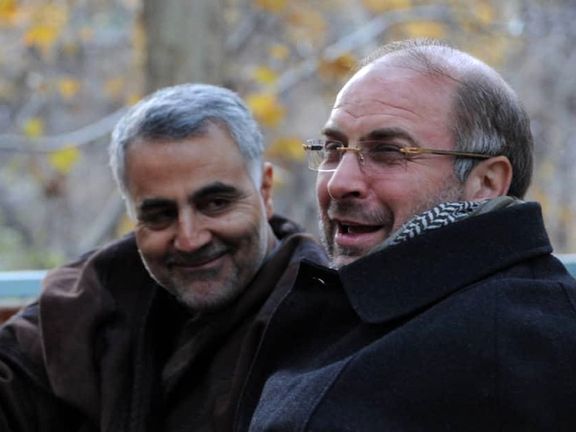
Mohammad Bagher Ghalibaf has been preparing for the presidency for years. He has occupied multiple senior command positions in the Islamic Revolutionary Guard Corps (IRGC), including as deputy commander of the Basij, head of its Khatam Al-Anbiya Construction Headquarters, and commander of the IRGC Air Force. During student protests in 1999, Ghalibaf signed onto a letter with other IRGC commanders threatening then-President Mohammad Khatami if more force was not used to suppress the demonstrations.
Later, Ghalibaf became head of Iran’s police, which is a position traditionally occupied by an IRGC commander. An audio recording emerged where Ghalibaf bragged to the Basij that he beat protesters with wooden sticks on the back of a motorbike in 1999 and that he ordered police to fire at protesters during campus demonstrations in 2003.
Afterwards, he became mayor of Tehran and rebranded himself as a technocratic manager. During his tenure, Ghalibaf hobnobbed with world leaders at the World Economic Forum in Davos in 2008. While there he told The New York Times, “We don’t need any atomic weapons or unconventional weapons” and was marketed as an “authoritarian modernizer.” He sought to distance himself from his old rival Mahmoud Ahmadinejad, who was then a firebrand president, by expressing a willingness for dialogue with the United States.
Ghalibaf has run unsuccessfully for president for years. When he campaigned for the office in 2005, leaked U.S. cables circulated about how the Supreme Leader’s son Mojtaba Khamenei, who is now considered a contender to succeed his father as supreme leader, “was reportedly the backbone” of Ghalibaf’s bids for political office. One indicated, “Mojtaba is said to help Ghalibaf as an advisor, financier, and provider of senior-level political support.” Although Mojtaba later convinced his father to switch his support to Ahmadinejad at the last minute, viewing him as more reliable—a prediction he would likely later regret given Ahmadinejad’s falling out with Khamenei.
But this shows Ghalibaf still enjoys a strong relationship with Khamenei’s inner circle, especially as he is reportedly a relative of the supreme leader. Both hail from Khorasan in the northeast, with Ghalibaf being born in Torqabeh near Mashhad, where Khamenei hails from.
In 2020, Ghalibaf became speaker of parliament. During his tenure, he presided over parliament’s passage—despite President Hassan Rouhani’s objections—of the Strategic Action Law to Lift Sanctions and Safeguard the National Interests of Iran, which mandated aggressive steps to accelerate Iran’s nuclear program and restrict International Atomic Energy Agency (IAEA) monitoring.
He has been implicated over the years in spectacular corruption scandals. An audio recording emerged in 2022 of Ghalibaf being engaged in a cover-up of embezzlement during his time as mayor of Tehran of around $3 billion. Ghalibaf suggested signing a fake contract to conceal its disappearance. Photos also emerged in 2022 of Ghalibaf’s family returning from a shopping trip in Turkey with a large layette set which generated controversy given his previous criticisms of a candidate for president of buying baby clothes in Italy and at a time when Iranians were struggling under crushing economic mismanagement. Ghalibaf’s son Es’haq was also denied a permanent residency application in Canada. Leaked documents emerged which showcased hundreds of thousands of dollars in his bank accounts abroad. Mohammad Bagher Ghalibaf himself has been sanctioned by Canada.
Thus far in this cycle, powerful elements in the IRGC are promoting Ghalibaf’s candidacy, with Tasnim, an IRGC-affiliated outlet, defending him. Journalists who revealed Ghalibaf’s corruption were also conveniently arrested this week as Ghalibaf entered the presidential contest. If successful, Ghalibaf would be the first president under Khamenei to have served as a senior career commander of the IRGC. Having Ghalibaf in the presidency would thus ensure IRGC equities are protected in a succession process should Khamenei, at 85 years old, pass away during his tenure.
Saeed Jalili
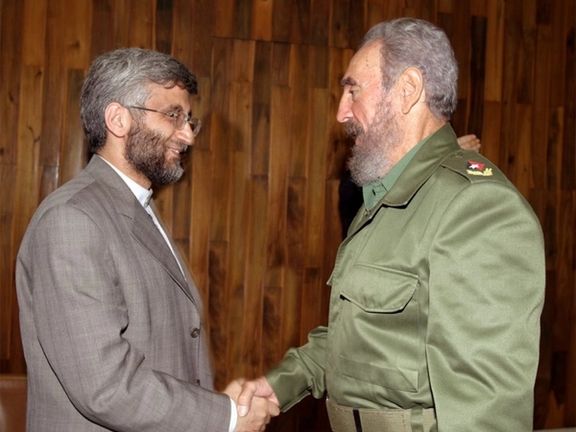
Saeed Jalili has been nicknamed “a living martyr” after losing one of his legs during the Iran-Iraq War as a member of the Basij. Like Khamenei, he was born in Mashhad, and holds a Ph.D. from Imam Sadegh University, an ideological training ground for the regime. His dissertation was entitled “The Foundation of Islamic Political Thought in the Quran.”
Jalili has held a series of positions spanning the Office of the Supreme Leader, Iran’s Foreign Ministry, and on the Supreme National Security Council (SNSC). They include head of Iran’s Foreign Ministry’s Inspection Office, head of the Foreign Ministry’s US Affairs Office, a senior director in Khamenei’s office, deputy foreign minister for European and American Affairs, secretary of the SNSC, and later the supreme leader’s personal representative on the SNSC.
CIA Director Bill Burns once described Jalili in his memoir as “stupefyingly opaque” and that he did not envy his students. Jalili in 2022 reportedly advocated for Iran increasing uranium enrichment to 90%, which is weapons-grade. He is an ideologue, steeped in the theocracy’s revolutionary ethos. Like Ghalibaf, Jalili is sanctioned by Canada. But Ghalibaf has reportedly been trying to sabotage Jalili’s chances—positioning himself as a more pragmatic hardliner.
Amir-Hossein Ghazizadeh Hashemi

Amir-Hossein Ghazizadeh Hashemi is a physician by training. A former member of parliament, he served as a member of its presidium and first deputy speaker. He ran for the presidency in 2021 but lost. Ebrahim Raisi later named him as a vice president and head of the Martyrs and Veterans Affairs Foundation. This Iranian parastatal foundation is under sanctions for directing financial resources to terrorist organizations, particularly Hezbollah. It has numerous businesses, especially in Lebanon, which are directed by Hezbollah’s Executive Council, whose holdings across various sectors provide the terrorist organization with vital funding. Martyrs and Veterans Affairs Foundation officials also took part in Hezbollah operations against Israel during the 2006 Lebanon War.
Alireza Zakani
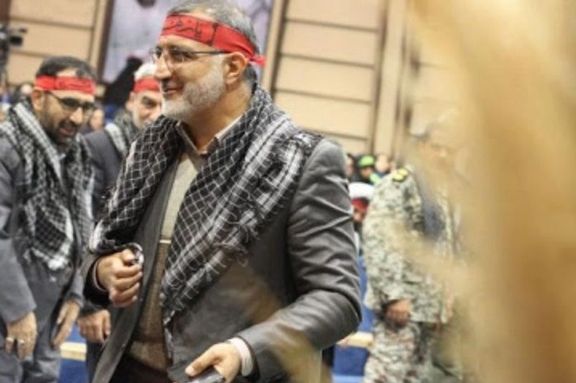
Alireza Zakani has held a series of posts in the Islamic Republic, including as head of the IRGC’s Student Basij Organization (SBO), a member of parliament, president of the Parliament’s Research Center, and currently mayor of Tehran. He is under UK sanctions for the commission of serious human rights abuses in Iran and generated controversy when he visited Brussels in 2023 given his record. When he was a legislator, Zakani headed a parliamentary commission on the nuclear deal, where he emerged as a leading critic of the negotiations with the P5+1. As mayor of Tehran, Zakani has spearheaded the Noor Plan to forcibly enforce the hijab on Iranian women. His tenure in Tehran has witnessed multiple scandals, including around $336 million missing. Zakani reportedly has multiple wives, with embarrassing personal revelations recently emerging on the subject. His decision to support construction of mosques in public parks also generated controversy.
Zakani ran unsuccessfully for president in 2021. Ahmadinejad rose from mayor of Tehran to become president in 2005. However, Zakani faces an uphill climb with more established conservatives like Ghalibaf and Jalili on the field. That is not to mention that Zakani, who was Ghalibaf’s campaign manager in his unsuccessful 2005 presidential bid, now running against his old boss will make for an awkward dynamic.
Mostafa Pourmohammadi
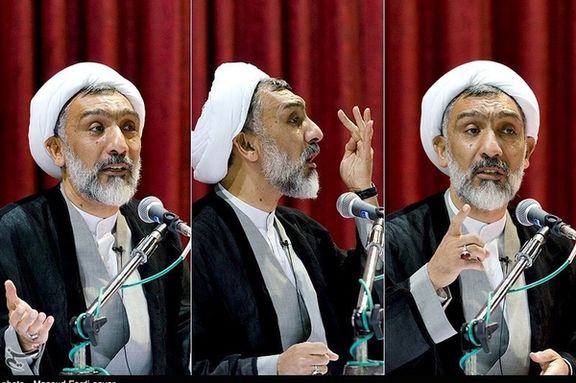
Born in Qom, Mostafa Pourmohammadi is the sole cleric to be approved to run for the presidency in 2024. He attended the Haqqani Seminary and served in a series of positions including as revolutionary prosecutor in Masjed Soleyman, Hormozgan, and Khorasan; deputy intelligence minister and the Intelligence Ministry’s representative in Evin Prison; head of the social-political bureau in the Office of the Supreme Leader; and head of the General Inspectorate Organization. He later became interior minister in the conservative Ahmadinejad presidency and justice minister in the pragmatic Rouhani administration. Thus, Pourmohammadi has a considerable bureaucratic pedigree across political factions, Khamenei’s office, the judiciary, and executive branch. He shares career overlaps with Jalili, who also was a member of Khamenei’s staff and Ebrahim Raisi, who likewise served as head of the General Inspectorate Organization.
Pourmohammadi is notorious to Iranians given his service with Raisi on a Death Commission which greenlighted the executions of thousands of political prisoners in 1988. He is cognizant, however, of waning public support for the Islamic Republic, admitting in 2023 that “popular satisfaction has declined” and that “the young generation has distanced itself from us.” Yet he was disqualified from running for the Assembly of Experts, the chamber that will choose Khamenei’s successor, in 2024. This is despite Pourmohammadi having proved loyal to Khamenei in disclosing electoral irregularities to him without Ahmadinejad’s knowledge, prompting his dismissal as interior minister in 2008.
Masoud Pezeshkian
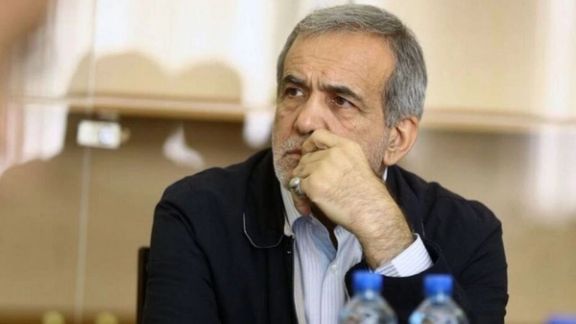
Masoud Pezeshkian is the sole ‘reformist’ permitted to run in this election. A heart surgeon by training, he previously served as health minister in the administration of Mohammad Khatami. In 2003, the parliament tried to impeach him unsuccessfully, citing incompetence in his appointments, inappropriate use of a loan, and other issues. His experience during this time tracked with other Khatami ministers who were targeted by conservatives for the reformist tendencies of his presidency. Later, Pezeshkian was elected to parliament and rose to become a deputy speaker.
He has been outspoken in criticizing the government over the issue of hijab enforcement. After the murder of Mahsa Amini in 2022, he told an interviewer that “we want our children to be modest, but if our behavior makes them hate our religion, we should at the very least refrain from continuing with this method.” He has been critical of parliament members chanting death to certain countries, arguing “we need to tolerate others and work and collaborate with the world.” He has also been a supporter of the Iran nuclear deal.
Yet Pezeshkian, while condemnatory of the Raisi administration as being incapable of solving Iran’s problems, has not crossed the line in publicly complaining about Khamenei. He has also championed core regime principles that the United States is the root cause of tension in the region and hailed cooperation with Russia as both countries are subject to sanctions.
Pezeshkian will make a bid to generate excitement and voter turnout given his ‘reformist’ roots—his campaign motto is already “For Iran,” which likely seeks to exploit the Shervin Hajipour song ‘Baraye’ that became the anthem of the Woman, Life, Freedom movement. He is already copying gimmicks of Abdolnaser Hemmati, who lost the 2021 presidential race. Back then, Hemmati pledged to make Javad Zarif the first vice president or foreign minister again. During this cycle, Pezeshkian has hinted about his intention to include figures like Zarif in his administration if he wins. Zarif has in turn endorsed him. But the failed experience of Khatami’s presidency looms large in the memory of many Iranians, who believe the Islamic Republic must end, and that reformists and conservatives are two sides of the same corrupted, incompetent, and repressive coin.

Ali Larijani, a former Speaker of Iran's Parliament, has condemned the Guardian Council's decision to disqualify his candidacy for presidency, calling the system 'opaque'.
"Despite positive opinions from responsible bodies and the judiciary's ruling against some past claims of the council, the Guardian Council, through an opaque mechanism, has created an obstacle in the path of such cooperation," Larijani declared in a statement.
He added, "I had hoped that with your support, we could overcome the obstacles and pave the way for Iran's national development."
Critics quickly highlighted the irony in Larijani's statement. "Read Ali Larijani's statement about his disqualification; this guy couldn't even tell the Guardian Council 'boo' in defense of his own rights, yet he was planning to save the Iranian people. The others are just like our own Larijani, don't over inflate them," wrote a user.
The Guardian Council in Iran plays a crucial role in the country's political landscape, particularly through its authoritarian power to vet and disqualify candidates for various elections, including the presidential race. Out of 80 candidates who registered for the upcoming June 28 snap election following the sudden death of President Ebrahim Raisi in a helicopter crash, 74 were axed by the council.
Comprising twelve members—six appointed by the Supreme Leader and six jurists nominated by the judiciary and approved by the parliament—the council is ultimately tasked with carrying out the wishes of the Supreme Leader.